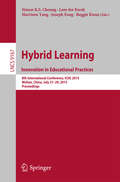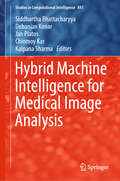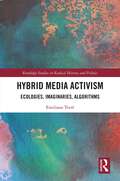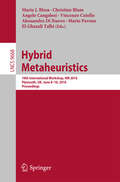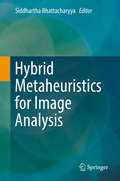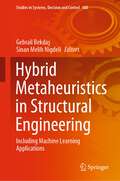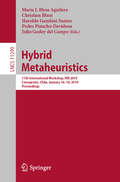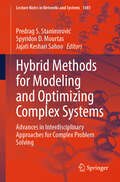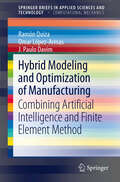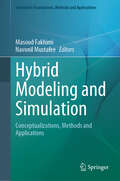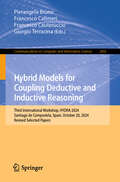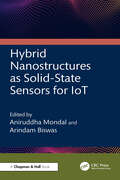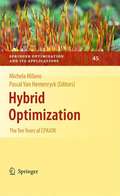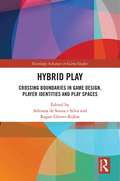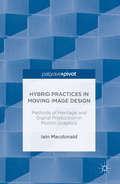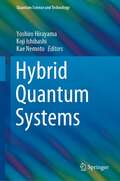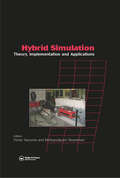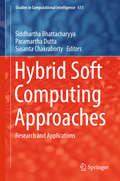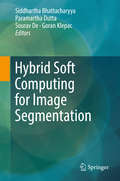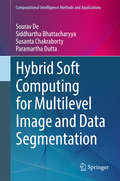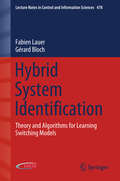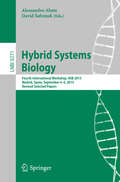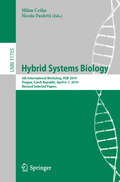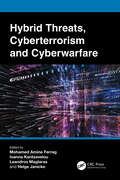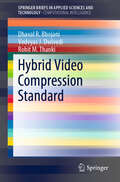- Table View
- List View
Hybrid Learning: Innovation in Educational Practices
by Simon K.S. Cheung Lam-For Kwok Harrison Yang Joseph Fong Reggie KwanThis book constitutes the refereed proceedings of the 8th International Conference on Hybrid Learning, ICHL 2015, held in Wuhan, China, in July 2015. The 35 papers presented were carefully reviewed and selected from 104 submissions. The selected papers cover various aspects on experiences in hybrid learning, computer supported collaborative learning, improved flexibility of learning processes, learning styles and behaviours, and pedagogical and other issues.
Hybrid Machine Intelligence for Medical Image Analysis (Studies in Computational Intelligence #841)
by Kalpana Sharma Siddhartha Bhattacharyya Debanjan Konar Jan Platos Chinmoy KarThe book discusses the impact of machine learning and computational intelligent algorithms on medical image data processing, and introduces the latest trends in machine learning technologies and computational intelligence for intelligent medical image analysis. The topics covered include automated region of interest detection of magnetic resonance images based on center of gravity; brain tumor detection through low-level features detection; automatic MRI image segmentation for brain tumor detection using the multi-level sigmoid activation function; and computer-aided detection of mammographic lesions using convolutional neural networks.
Hybrid Media Activism: Ecologies, Imaginaries, Algorithms (Routledge Studies in Radical History and Politics)
by Emiliano TreréThis book is an extensive investigation of the complexities, ambiguities and shortcomings of contemporary digital activism. The author deconstructs the reductionism of the literature on social movements and communication, proposing a new conceptual vocabulary based on practices, ecologies, imaginaries and algorithms to account for the communicative complexity of protest movements. Drawing on extensive fieldwork on social movements, collectives and political parties in Spain, Italy and Mexico, this book disentangles the hybrid nature of contemporary activism. It shows how activists operate merging the physical and the digital, the human and the non-human, the old and the new, the internal and the external, the corporate and the alternative. The author illustrates the ambivalent character of contemporary digital activism, demonstrating that media imaginaries can be either used to conceal authoritarianism, or to reimagine democracy. The book looks at both side of algorithmic power, shedding light on strategies of repression and propaganda, and scrutinizing manifestations of algorithms as appropriation and resistance. The author analyses the way in which digital activism is not an immediate solution to intricate political problems, and argues that it can only be effective when a set of favourable social, political, and cultural conditions align. Assessing whether digital activism can generate and sustain long-term processes of social and political change, this book will be of interest to students and scholars researching radical politics, social movements, digital activism, political participation and current affairs more generally.
Hybrid Metaheuristics
by Angelo Cangelosi Christian Blum Maria J. Blesa Vincenzo Cutello Alessandro Di Nuovo Mario Pavone El-Ghazali TalbiThis book constitutes the refereed proceedings of the 10th International Workshop on Hybrid Metaheuristics, HM 2016, held in Plymouth, UK, in June 2016. The 15 revised full papers presented were carefully reviewed and selected from 43 submissions. The selected papers are of interest for all the researchers working on integrating metaheuristics with other areas for solving both optimization and constraint satisfaction problems. They represent as well a sample of current research demonstrating how metaheuristics can be integrated with integer linear programming and other operational research techniques for tackling difficult and relevant problems.
Hybrid Metaheuristics for Image Analysis
by Siddhartha BhattacharyyaThis book presents contributions in the field of computational intelligence for the purpose of image analysis. The chapters discuss how problems such as image segmentation, edge detection, face recognition, feature extraction, and image contrast enhancement can be solved using techniques such as genetic algorithms and particle swarm optimization. The contributions provide a multidimensional approach, and the book will be useful for researchers in computer science, electrical engineering, and information technology.
Hybrid Metaheuristics in Structural Engineering: Including Machine Learning Applications (Studies in Systems, Decision and Control #480)
by Gebrail Bekdaş Sinan Melih NigdeliFrom the start of life, people used their brains to make something better in design in ordinary works. Due to that, metaheuristics are essential to living things, and several inspirations from life have been used in the generation of new algorithms. These algorithms have unique features, but the usage of different features of different algorithms may give more effective optimum results in means of precision in optimum results, computational effort, and convergence. This book is a timely book to summarize the latest developments in the optimization of structural engineering systems covering all classical approaches and new trends including hybrids metaheuristic algorithms. Also, artificial intelligence and machine learning methods are included to predict optimum results by skipping long optimization processes. The main objective of this book is to introduce the fundamentals and current development of methods and their applications in structural engineering.
Hybrid Metaheuristics: 11th International Workshop, HM 2019, Concepción, Chile, January 16–18, 2019, Proceedings (Lecture Notes in Computer Science #11299)
by Christian Blum Maria J. Blesa Aguilera Haroldo Gambini Santos Pedro Pinacho-Davidson Julio Godoy del CampoThis book constitutes the refereed proceedings of the 11th International Workshop on Hybrid Metaheuristics, HM 2019, held in Concepción, Chile, in January 2019. The 11 revised full papers and 5 short papers presented were carefully reviewed and selected from 23 submissions. The papers present hybridization strategies and explore the integration of new techniques coming from other areas of expertise. They cover a variety of topics such as low-level hybridization, high-level hybridization, portfolio techniques, cooperative search, and theoretical aspects of hybridization.
Hybrid Methods for Modeling and Optimizing Complex Systems: Advances in Interdisciplinary Approaches for Complex Problem Solving (Lecture Notes in Networks and Systems #1481)
by Predrag S. Stanimirović Spyridon D. Mourtas Jajati Keshari SahooDelivering innovative methods for addressing complex systems, this book presents the latest advances in hybrid modeling, machine learning, and digital technologies. Based on selected papers from the III International Workshop &“Hybrid Methods of Modeling and Optimization in Complex Systems&” held December 2–4, 2024, in Krasnoyarsk, Russia, the book covers hybrid modeling and optimization, intelligent data analysis, financial forecasting, industrial and educational digitalization, AI-guided decision support, and digital system security. Readers will find such interdisciplinary applications as climate project modeling, agricultural digital services, and the digital platform economy; e-learning analysis and digital competence development; digital twins and production optimization; as well as research on network systems. It is essential for researchers, practitioners, and educators seeking practical solutions and advanced hybrid methods for diverse scientific and engineering challenges.
Hybrid Modeling and Optimization of Manufacturing
by J. Paulo Davim Omar López-Armas Ramón QuizaArtificial intelligence (AI) techniques and the finite element method (FEM) are both powerful computing tools, which are extensively used for modeling and optimizing manufacturing processes. The combination of these tools has resulted in a new flexible and robust approach as several recent studies have shown. This book aims to review the work already done in this field as well as to expose the new possibilities and foreseen trends. The book is expected to be useful for postgraduate students and researchers, working in the area of modeling and optimization of manufacturing processes.
Hybrid Modeling and Simulation: Conceptualizations, Methods and Applications (Simulation Foundations, Methods and Applications)
by Navonil Mustafee Masoud FakhimiThe unique book advances understanding of modelling complex systems using hybrid approaches that combine discrete-event, agent-based, and system dynamic simulations with research approaches and artefacts from other scientific disciplines. As systems become increasingly large and complex, it is a challenge to capture the intricacies of the underlying system and offer novel forms of analysis using only models that employ a single simulation technique. The book underscores the importance of both hybrid simulation (employing techniques primarily developed in the field of modelling and simulation) and hybrid modelling (incorporating simulation with methods from wider disciplines such as applied computing, data science, engineering, and soft/qualitative operations research). Furthermore, the text aims to inspire further research and practice, fostering the growth of cross-disciplinary hybrid models. Topics and features: Provides a comprehensive overview of hybrid modelling and simulation, including methodological extensions and novel applications Features case studies and examples demonstrating the synergy realized by applying hybrid methods Calls for innovation and growth of the discipline by incorporating diverse scientific perspectives Encourages adoption of interdisciplinary methods to engender improved insights from simulation studies Promotes interdisciplinary collaboration, pushing modelling and simulation into new research and application areas This comprehensive volume will appeal to researchers, academics, students, and practitioners who seek to advance their modelling and simulation work. The book also will serve as a reference, informing research communities of the potential of hybrid models that combine simulation with disciplinary research artefacts, methods, and approaches.
Hybrid Models for Coupling Deductive and Inductive Reasoning: Third International Workshop, HYDRA 2024, Santiago de Compostela, Spain, October 20, 2024, Revised Selected Papers (Communications in Computer and Information Science #2492)
by Francesco Calimeri Giorgio Terracina Pierangela Bruno Francesco CauteruccioThis book constitutes the refereed proceedings of the Third International Workshop on Hybrid Models for Coupling Deductive and Inductive Reasoning, HYDRA 2024, held in Santiago de Compostela, Spain, on October 20, 2024. The 6 full papers and 1 invited talk included in this book were carefully reviewed and selected from 7 submissions.The International Workshop on Hybrid Models for Coupling Deductive andInductive Reasoning (HYDRA) was designed as a forum for researchers to explore the exciting possibilities at the intersection of deductive and inductive reasoning.
Hybrid Nanostructures as Solid-State Sensors for IoT
by Arindam Biswas Aniruddha MondalThe book provides an in-depth discussion of various Hybrid Nanostructures as solid-state sensors in the context of the Internet of Things (IoT). It explains the vital role that sensors play in IoT to aid in discovering what possibilities ought to be addressed to make the data more meaningful. The book highlights the applicability of biosensing field effect transistor (FET) technology with a specific emphasis on the progress being made in integrating existing FET technology and nanotechnology, using semiconductor nanowires and organic structures.• Offers in-depth discussion on Hybrid Nanostructures as solid-state sensors• Elaborates upon the fabrication of gas sensors using metal oxide semiconductor nanostructures• Studies biosensors based on metal oxide semiconductor nanostructures• Discusses the suitability of various Hybrid Sensors in solving the problems of the Internet of Things (IoT)• Provides extensive support for the development of Hybrid Nanostructures as solid-state sensorsThe book is meant for researchers and scholars of Computer Science and associated disciplines. It also serves as a valuable reference for graduate students, researchers, seeking to deepen their knowledge and engage with the latest advancements in these Hybrid Nanostructures as solid-state sensors.
Hybrid Optimization: The Ten Years of CPAIOR (Springer Optimization and Its Applications #45)
by Pascal Van Hentenryck Michela MilanoHybrid Optimization focuses on the application of artificial intelligence and operations research techniques to constraint programming for solving combinatorial optimization problems. This book covers the most relevant topics investigated in the last ten years by leading experts in the field, and speculates about future directions for research. This book includes contributions by experts from different but related areas of research including constraint programming, decision theory, operations research, SAT, artificial intelligence, as well as others. These diverse perspectives are actively combined and contrasted in order to evaluate their relative advantages. This volume presents techniques for hybrid modeling, integrated solving strategies including global constraints, decomposition techniques, use of relaxations, and search strategies including tree search local search and metaheuristics. Various applications of the techniques presented as well as supplementary computational tools are also discussed.
Hybrid Play: Crossing Boundaries in Game Design, Players Identities and Play Spaces (Routledge Advances in Game Studies)
by Adriana de Souza e SilvaThis book explores hybrid play as a site of interdisciplinary activity—one that is capable of generating new forms of mobility, communication, subjects, and artistic expression as well as new ways of interacting with and understanding the world. The chapters in this collection explore hybrid making, hybrid subjects, and hybrid spaces, generating interesting conversations about the past, current and future nature of hybrid play. Together, the authors offer important insights into how place and space are co-constructed through play; how, when, and for what reasons people occupy hybrid spaces; and how cultural practices shape elements of play and vice versa. A diverse group of scholars and practitioners provides a rich interdisciplinary perspective, which will be of great interest to those working in the areas of games studies, media studies, communication, gender studies, and media arts.
Hybrid Practices in Moving Image Design
by Iain MacdonaldThis book, written from the perspective of a designer and educator, brings to the attention of media historians, fellow practitioners and students the innovative practices of leading moving image designers. Moving image design, whether viewed as television and movie title sequences, movie visual effects, animating infographics, branding and advertising, or as an art form, is being increasingly recognised as an important dynamic part of contemporary culture. For many practitioners this has been long overdue. Central to these designers' practice is the hybridisation of digital and heritage methods. Macdonald uses interviews with world-leading motion graphic designers, moving image artists and Oscar nominated visual effects supervisors to examine the hybrid moving image, which re-invigorates both heritage practices and the handmade and analogue crafts. Now is the time to ensure that heritage skills do not atrophy, but that their qualities and provenance are understood as potent components with digital practices in new hybrids.
Hybrid Quantum Systems (Quantum Science and Technology)
by Yoshiro Hirayama Koji Ishibashi Kae NemotoThis book presents state-of-the-art research on quantum hybridization, manipulation, and measurement in the context of hybrid quantum systems. It covers a broad range of experimental and theoretical topics relevant to quantum hybridization, manipulation, and measurement technologies, including a magnetic field sensor based on spin qubits in diamond NV centers, coherently coupled superconductor qubits, novel coherent couplings between electron and nuclear spin, photons and phonons, and coherent coupling of atoms and photons. Each topic is concisely described by an expert at the forefront of the field, helping readers quickly catch up on the latest advances in fundamental sciences and technologies of hybrid quantum systems, while also providing an essential overview.
Hybrid Simulation: Theory, Implementation and Applications
by Victor Saouma Mettupulayam SivaselvanHybrid Simulation: Theory, Implementation and Applications deals with a rapidly evolving technology combining computer simulation (typically finite element) and physical laboratory testing of two complementary substructures. It is a multidisciplinary technology which relies heavily on control theory, computer science, numerical techniques and finds applications in aerospace, civil, and mechanical engineering.
Hybrid Soft Computing Approaches
by Siddhartha Bhattacharyya Paramartha Dutta Susanta ChakrabortyThe book provides a platform for dealing with the flaws and failings of the soft computing paradigm through different manifestations. The different chapters highlight the necessity of the hybrid soft computing methodology in general with emphasis on several application perspectives in particular. Typical examples include (a) Study of Economic Load Dispatch by Various Hybrid Optimization Techniques, (b) An Application of Color Magnetic Resonance Brain Image Segmentation by Para Optimus LG Activation Function, (c) Hybrid Rough-PSO Approach in Remote Sensing Imagery Analysis, (d) A Study and Analysis of Hybrid Intelligent Techniques for Breast Cancer Detection using Breast Thermograms, and (e) Hybridization of 2D-3D Images for Human Face Recognition. The elaborate findings of the chapters enhance the exhibition of the hybrid soft computing paradigm in the field of intelligent computing.
Hybrid Soft Computing for Image Segmentation
by Siddhartha Bhattacharyya Paramartha Dutta Sourav De Goran KlepacThis book proposes soft computing techniques for segmenting real-life images in applications such as image processing, image mining, video surveillance, and intelligent transportation systems. The book suggests hybrids deriving from three main approaches: fuzzy systems, primarily used for handling real-life problems that involve uncertainty; artificial neural networks, usually applied for machine cognition, learning, and recognition; and evolutionary computation, mainly used for search, exploration, efficient exploitation of contextual information, and optimization. The contributed chapters discuss both the strengths and the weaknesses of the approaches, and the book will be valuable for researchers and graduate students in the domains of image processing and computational intelligence.
Hybrid Soft Computing for Multilevel Image and Data Segmentation
by Siddhartha Bhattacharyya Paramartha Dutta Susanta Chakraborty Sourav DeThis book explains efficient solutions for segmenting the intensity levels of different types of multilevel images. The authors present hybrid soft computing techniques, which have advantages over conventional soft computing solutions as they incorporate data heterogeneity into the clustering/segmentation procedures. This is a useful introduction and reference for researchers and graduate students of computer science and electronics engineering, particularly in the domains of image processing and computational intelligence.
Hybrid System Identification: Theory and Algorithms for Learning Switching Models (Lecture Notes in Control and Information Sciences #478)
by Fabien Lauer Gérard BlochHybrid System Identification helps readers to build mathematical models of dynamical systems switching between different operating modes, from their experimental observations. It provides an overview of the interaction between system identification, machine learning and pattern recognition fields in explaining and analysing hybrid system identification. It emphasises the optimization and computational complexity issues that lie at the core of the problems considered and sets them aside from standard system identification problems. The book presents practical methods that leverage this complexity, as well as a broad view of state-of-the-art machine learning methods.The authors illustrate the key technical points using examples and figures to help the reader understand the material. The book includes an in-depth discussion and computational analysis of hybrid system identification problems, moving from the basic questions of the definition of hybrid systems and system identification to methods of hybrid system identification and the estimation of switched linear/affine and piecewise affine models. The authors also give an overview of the various applications of hybrid systems, discuss the connections to other fields, and describe more advanced material on recursive, state-space and nonlinear hybrid system identification.Hybrid System Identification includes a detailed exposition of major methods, which allows researchers and practitioners to acquaint themselves rapidly with state-of-the-art tools. The book is also a sound basis for graduate and undergraduate students studying this area of control, as the presentation and form of the book provides the background and coverage necessary for a full understanding of hybrid system identification, whether the reader is initially familiar with system identification related to hybrid systems or not.
Hybrid Systems Biology
by Alessandro Abate David ŠafránekThis book constitutes the thoroughly referred post-workshop proceedings of the 4th International Workshop on Hybrid Systems biology, HSB 2015, held as part of the Madrid Meet 2015 event, in Madrid, Spain in September 2015. The volume presents 13 full papers together with 2 abstracts of invited sessions from 18 submissions. The scope of the HSB workshop is the general area of dynamical models in Biology with an emphasis on hybrid approaches -- by no means restricted to a narrow class of mathematical models -- and taking advantage of techniques developed separately in different areas.
Hybrid Systems Biology: 6th International Workshop, HSB 2019, Prague, Czech Republic, April 6-7, 2019, Revised Selected Papers (Lecture Notes in Computer Science #11705)
by Nicola Paoletti Milan ČeškaThis book constitutes the thoroughly refereed proceedings of the 6th International Workshop on Hybrid Systems Biology, HSB 2019, held in Prague, Czech Republic, in April 2019.The 8 full papers presented in this book together with 1 short paper and 3 invited papers were carefully reviewed and selected from 13 submissions. They cover topics such as: modeling and analysis of metabolic, signaling, and genetic regulatory networks in living cells; models of tissues, organs, physiological models; models and methods coping with incomplete, uncertain and heterogeneous information including learning for biological systems, parametric synthesis and inference; stochastic and hybrid models in biology; hierarchical systems for multi-scale, multi-domain analysis; abstraction, approximation, discretization, and model reduction techniques; modeling, analysis and design for synthetic biology, cyber-biological systems and biomedical studies (e.g. therapies, teleoperation); game-theoretical frameworks and population models in biology (e.g. mixed-effects and Bayesian modeling); biological applications of quantitative and formal analysis techniques (e.g. reachability computation, model checking, abstract interpretation, bifurcation theory, stability and sensitivity analysis); efficient techniques for combined and heterogeneous (stochastic/deterministic, spatial/non-spatial) simulations for biological models; modeling languages and logics for biological systems with related analysis and simulation tools; and control architectures of biological systems including biology-in-the-loop systems and bio-robotics.
Hybrid Threats, Cyberterrorism and Cyberwarfare
by Helge Janicke Ioanna Kantzavelou Leandros Maglaras Mohamed Amine FerragNowadays, in Cyberspace there is a burst of information that everyone has access. However, apart from the advantages the Internet offers, it also hides numerous dangers for both people and nations. Cyberspace has a dark side, including terrorism, bullying, and other types of violence. Cyberwarfare is a kind of virtual war that causes the same destruction that a physical war would also do. A hybrid threat is an umbrella term, encompassing a wide variety of existing adverse circumstances and actions, such as terrorism, migration, piracy, corruption, ethnic conflict etc and is not exclusively a tool of asymmetric or non-state actors, but can be applied by state and non-state actors alike. ‘Cyber-conflict’ and ‘cyber-war’ serve as examples of the use of new technologies within the scope of hybrid threats. Cyber-war basically refers to a sustained computer-based cyber-attack by a state against the IT infrastructure of a target state. On the other hand cyber-security is a major factor that shapes productivity and efficiency of the modern industry in both technical and economic terms. The book discusses and analyses current posture of cyberterrorism, cyberwarfare, and hybrid threats, sector specific cyber-attacks that have the form of cyberterrorism and presents the recent actions that EU, USA and other Nations have taken in order to strengthen their systems against such attacks. There has never been a higher risk of a major catastrophe as a result of the rise in offensive cyber activity, particularly the possibility of cyber-physical strikes against critical services. Recent cyber-attacks against critical infrastructures along with the continuous migration crisis have been the main driving forces that led to the decision to publish this book.
Hybrid Video Compression Standard (SpringerBriefs in Applied Sciences and Technology)
by Rohit M. Thanki Vedvyas J. Dwivedi Dhaval R. BhojaniThe book presents compression techniques for digital video stream, describing their design using various image transforms, such as discrete cosine transform (DCT), discrete wavelet transform (DWT), and singular value decomposition (SVD). It first discusses the basic requirements and applications of video compression techniques. The book then addresses video compression using DCT as well as the hybrid compression technique, designed and implemented using DCT, DWT and SVD, demonstrating the simulation results for both. Lastly, it proposes future research directions in the field.
